- Home
- Elmore Leonard
Split Images Page 15
Split Images Read online
Page 15
"You better not write the book," Bryan said.
Then said, "Does Robbie have a girl friend now?"
"I don't know. He picks girls up." Angela thought of something and looked at him now. "It's funny, he talks about it, but he's not what you'd call a dedicated chaser."
"Maybe he likes guns better," Bryan said.
Robbie came out of the trees to the dead-end access road where Walter was waiting by the car, its frontend pointing toward the beach, the silver Rolls ghostly in the early darkness.
Walter said, "He still there?" The words came louder than he'd expected and he half-whispered, "In the house?"
"His car's still there," Robbie said.
"You didn't look in a window?"
"When I get that close," Robbie said, "it's gonna be done. But we're not quite ready yet. Two things.
I want pictures of the place--"
"What kinda pictures?"
"I'll show you the camera when we get home. I want movies. And I want you to watch the place for a few days. If he's bringing stuff in and out, and I'm sure he is, then I want to hit him when the stuff's here. You understand what I'm getting at?"
"You want the place put under one-man surveillance for a few days you say," Walter said. "I understand what you mean, but I don't think you do, if you don't mind my saying. The fuck'm I suppose to do, I camp here twenty-four hours? Who relieves me? Right now a squad car comes along, we're parked here in the fucking trees, two guys, the first thing they think of, somebody's copping somebody's joint. This whole area, any place you got houses worth a million bucks you got more security'n in a fucking bank, and I'm not kidding."
Robbie said, "Walter, look at the house."
"I think I saw it closer'n you did.""I mean--consider where it is. You can barely see it, even from the beach. Empty lots on both sides full of trees. You come out the driveway and walk across the road, there's the Intracoastal right there, almost in your backyard. And a dock. You notice the dock?"
"Yeah, I notice the dock?"
"Now we know little Dorie Vaughn didn't buy the house."
"All I know it's in her name."
"Walter," Robbie said, "a guy who makes two hundred thousand dollars a month on the side bought the house. Because it's exactly the house he wanted. He can take deliveries in front, right out of the ocean. Or he can come out the back door and pick up something left on his dock. A little watertight package that's worth around a million bucks.
But he doesn't pick it up, the girl does; she's got to be good for something. Then, I'll bet you anything, you see a yellow van stop by the house. The same van you'll see down in Coconut Grove. The same guy driving it who lives in that high rise on Brickel Avenue. It's all coming together, Walter. All the work I've been doing on this project is finally paying off. But now we get to the tricky part. I don't want to have to buy some stuff and plant it on him.
Christ, not when he's dealing in it. I want to get him, ideally, when he's in the house and there's a delivery sitting there. The police get an anonymouscall, they find the son of a bitch, he's dead and it's obviously a dope-related hit. That's the way I want it to work and that's why I brought you in, Walter.
Because you're a pro. You've forgotten more about surveillance than I could ever learn."
"Yeah, well I know surveillance," Walter said, "I've been on enough stakeouts in my life I should.
But you got other people around here working not exactly surveillance but close to it. Security."
"Who, the police?"
"The police."
"Walter," Robbie said, "if you can buy a house, pick out a house and buy it because it's ideally situated for what you're doing--no matter what it costs--then, Walter, you can buy any fucking thing you want. Including police. A couple a bills a week to see that no Haitians break in . . . and not see anything else."
Walter rubbed his hand over his jaw. "You're talking about a lot of surveillance."
"Bring a cooler of beer and a pack of Camels."
Robbie winked in the darkness. "Come on. I'm late."
They were on their third drink. Wild Turkey over ice.
Angela said, "Having fun at the club?"Bryan didn't answer and they were both silent for at least a full minute, comfortable together if not with the waiting, neither good at small talk so not trying too hard.
"Would you rather belong here or Seminole?"
"If I had to play the same course every day, Seminole," Bryan said. "I like the macaroni and cheese."
"Did you try the gingersnaps?"
"I've never been in a locker room before where they serve cookies. Palmer Park doesn't have a locker room. You finish a round in the evening you walk across Woodward and have a drink with the hookers. Seminole, you talk about real estate."
"I told you."
"I met one guy who doesn't fit the mold. Chichi Fuentes. I figured he was either a golf pro, a gigolo or an orchestra leader."
"I know him," Angela said. "In fact, if I do the book Chichi said he'll give me all kinds of trivia, for color. He knows everybody and everything that's going on in Palm Beach."
"He didn't seem to know Smiley."
Angela stared at him.
"Your mouth's open again."
"I just had a thought." One that seemed to disturb her. "What did Robbie say about him?"
"Nothing.""He didn't tell you anything? Who he is?"
"No, but Chichi told Smiley a few things about his wife. That's why I know the bald-headed guy with long hair's a count. A Polish count."
"Chichi," Angela said, hunching closer, "is an international playboy from the Dominican Republic. You see him in W all the time."
"Wow," Bryan said.
"Listen. I'm serious. You remember Trujillo?"
"He was a dictator. Kind of a fat guy."
"God and Trujillo, that was his motto," Angela said. "Supreme ruler of the Dominican Republic for about thirty years, until he was finally assassinated in, I think, '61. Well, Chichi's one of Trujillo's illegitimate sons. He married a sugarcane heiress first, then a very rich American woman and then an Italian movie actress. Women adore him."
"Why?"
"Because he's charming. He's a lover." She groped and came up with another one. "He knows what women like."
"Did you read that or did he tell you himself?"
"Bryan--he's rich. He plays polo. He used to drive sports cars. He's held diplomatic posts all over the world. Charge d'affaires in Paris, a lot of places.
In fact, right now he's inspector of embassies for the Dominican Republic . . . I'm serious. He's single . . . probably the most eligible bachelor in Palm Beach.""Robbie doesn't like him."
"You know why? Robbie would like to be him."
"Or George Hamilton. What else does he do?"
"Well, he's broken up a few marriages, once was named corespondent of the year. Let's see--over like a three-year period he collected seventy-seven parking tickets in Palm Beach County and was stopped something like twenty times for speeding.
My friend at the Post did a story about it, how Chichi flaunts his diplomatic immunity and tears up tickets." Angela paused, thoughtful. "There was something else," she said and paused again and began to nod.
Bryan watched her, used to waiting for answers.
"Yeah--he was called before a Dade County grand jury that had something to do with doperelated murders, I think in Miami. I read it when I was researching him, but I don't remember when it was."
"What happened?"
"He refused to waive immunity, so they couldn't talk to him."
"They didn't ask him to leave the country?"
"I don't think they wanted to indict him. Chichi was called as a witness. He had business dealings, I think, with whoever it was they were after."
"Maybe he's a high-class smuggler," Bryan said.
"Uses his diplomatic pouch."
"Cheech? I doubt it. He doesn't need money.""How do you know?"
Angela didn't answer.
"At the club
, the first thing Robbie said to him was how's the coke business?"
"He did?"
"Then at his house," Bryan said, "we're playing his game, who would you like to shoot? Robbie goes, well, there's Carlos the terrorist. Maybe someday. And then he said, 'But a more realistic one might be--' and paused like he had to think of one before it came to him--'How about a big-time dope dealer? Somebody who's messing up people's lives and the law can't touch him.' "
"I can't see Chichi as a dealer," Angela said.
"He's the great seducer. He told me he hasn't slept alone since he was fourteen years old."
"Maybe he's afraid of the dark."
"I can't see him bothering with something like that, smuggling. He's not the type."
"Maybe not," Bryan said. "But Robbie didn't offer the drug dealer as an example. I think the idea appeals to him. Somebody bad who's close by."
Angela said, "Does Chichi look like a bad guy to you?"
Bryan said, "Does Robbie? . . . When I first mentioned Chichi you got a funny look on your face and you said, 'I just had a thought . . . ' "
"I wasn't thinking about dope.""No, it was before we got into that."
"Oh--" Angela came alive. "You said he didn't seem to know Robbie and I thought--right away I thought, what if Chichi's the one he wants to kill?"
"Why would he?"
"That's the trouble, the motive's so flimsy--"
"Because he doesn't like him?"
"Sort of, but more because Chichi never remembers Robbie's name," Angela said. "Does that sound dumb?"
Ruth May Hayes, thirty-seven, was tied by the neck to the rear bumper of her boyfriend's car and dragged in circles over a field until she was dead.
Robert Jackson, thirty-four, and James Pope, thirty-five, died in a gunfight that developed when Jackson put his cigarette out in a clean ashtray. Sam James, thirty-five, told his wife their twelve-yearold daughter's shorts were too tight; an argument followed and James was stabbed to death. Paul Struggs, twenty-nine, was shot to death by his girl friend. Richard Scott, twenty-three, was shaking hands with people he'd been arguing with at a party when someone struck him from behind with a baseball bat and killed him. Myros Cato, fortyseven, was shot to death by his wife following an argument. James Ware, sixty-five, was shot todeath by his son, a psychiatric patient at Veterans Hospital. Charles Roby, thirty-two, got in an argument with his girl friend over a pack of cigarettes and she stabbed him to death. Gloria Glass, fifty, told James Lindsey, fifty-six, they were through;
Lindsey shot and killed her. Betty Goodlow, thirtytwo, was beaten, doused with paint thinner and set on fire by her boyfriend. Michael Kirby, twentyfive, got into an argument with the babysitter, who stabbed him in the head, then shot him with a rifle.
Geraldine Phillips, thirty-five, told her boyfriend she was going to jog around the block; he became enraged and stabbed her to death. Marvin Rife, nineteen, was throwing bottles at a neighbor's house when the neighbor came out with a shotgun and killed him. Benny Vann, forty-one, was shot to death by his girl friend because he'd dated her sister. Larry Young, sixteen, pulled a toy gun on his friend and said, boom; his friend, twenty-three, pulled a real gun and killed him. George Peterson, fifty-one, came out of a bar and mistakenly got in someone else's car; he was pulled out by the car's owner, identity unknown, and kicked to death. Cecil Castner, twenty-five, swiped at Delois Tanksley, twenty-one, with a knife; she hit him with a chair, got a handgun from the bedroom and shot him in the back of the head; she was convicted of careless use of a firearm resulting in death and drew eighteen months probation. Joseph Vennie, fifty-five, was angry when L. C. Ford, forty, locked out of his car, woke Vennie up and asked him for a coat hanger; Vennie struck Ford over the head with a gun; Ford took the gun away from him and killed him with it.
There were approximately six hundred seventy additional homicides, not unlike these, that had taken place in the Detroit area during the past year and were familiar stories to Bryan Hurd.
He said to Angela, "I can tell you how people kill each other and sometimes why and you tell me if any of the motives make sense."
She said, "So it doesn't matter if the reason sounds weird."
He said, "To tell you the truth, killing someone who doesn't remember your name makes more sense than most."
She said, "What do we do now?"
He said, "Let's get out of here and have a Jack Daniels someplace."
BRYAN MADE PHONE CALLS most of the morning with the yellow pages open in front of him and by two that afternoon they had moved from the Holiday Inn in Palm Beach Gardens to the Villas Atlantis in Lake Worth, on the beach and only about five miles south of Robbie's home on South Ocean Boulevard.
"I didn't come thirteen hundred miles to sit by a swimming pool," Bryan said. "I like the ocean."
Angela said, "Uh-huh." She was sure they'd moved to be closer to the action, to keep an eye on Robbie.
Except that Bryan didn't contact Robbie. He wasn't kidding, he sat on the beach. He did make phone calls home from their Atlantis villa that was actually an efficiency and talked to Annie Maguire or Malik, keeping in touch. But most of the time for the next two days he was out there in the sun with his National Geographic s. He told Angela interesting facts about owls, kelp life and jackals.
She said, "Nobody even knows we're here."He said, "Good."
"Aren't you gonna do something?"
Bryan said, "You asked me--I told you I was going to Florida to sit on the beach and read and you asked me if I read mysteries? I said no. I don't read mysteries for the same reason I don't involve myself in homicide investigations when I'm on furlough. That's the whole idea of a furlough. Get away from it."
"But if you know someone's gonna get killed . . ."
Bryan said, "I know of, I bet, five hundred people in Detroit who could very likely kill each other or somebody else in the near future. I don't know how to prevent homicides. I go in after and clean up."
She said, "At least tell him you know what he's doing."
"Who, Robbie? He told me."
"Then we should tell Chichi . . . some thing."
"If he's in drugs he's watching his ass very carefully. You don't have to tell him a thing."
"But we don't know he is, for sure."
Bryan closed the National Geographic, got up from his beach chair, went into Villa Number 16, the third one back from the beach in the line of cement bungalows and made a phone call while Angela stood watching him in her red bikini and he watched Angela. He called young Gary Hammond of the Palm Beach Police. Angela could hear the sound of Gary's voice but not what he was saying. When Bryan hung up she pounced on him. "What did he say?"
"Wait."
They had a glass of orange juice in the airconditioned efficiency. Gary Hammond called back and Bryan listened; he said uh-huh several times, he asked Gary how he was doing, asked what was a good place to eat on a cop's pay, said great, I appreciate it and hung up.
He said to Angela, still waiting, "Chichi's the source for the Palm Beach crowd, the swingers who've moved up from Cuba Libres to just plain coke. He passes out weed gratis. He's small potatoes locally but a name in Miami. He's sort of an importer-broker. He doesn't deal directly, he makes phone calls and goes to Bogota or Santa Marta a few times a year. And because he's in the diplomatic corps they can't touch him."
"Exactly the guy," Angela said, "that Robbie proposed to you. The untouchable asshole, the ideal target." She was silent for several moments, thoughtful.
"You know what? I'm doing the wrong story."
Bryan watched her move to the closet now and come out with white pants that were like string-tied pajama bottoms and a T-shirt.
"Where you going?"
"Do some research," Angela said.
Walter spent the first day thrashing around in the scrub without getting even a glimpse of Chichi Fuentes. Hotter'n a son of a bitch in there. He could hardly breathe. Trying to swat bugs and work the goddamn Jap camera, the goddamn equipment, the
videotape recorder and the battery pack, hanging by straps around his neck, either strangling him or banging his knees or getting tangled up in the brush.
"That's right, I forgot to tell you," Robbie said.
"Afternoons Chichi's either at Seminole or Palm Beach Polo in Wellington." He said, "Sorry about that, Walter."
Walter said, "You know how many different kinds of bugs're in there, just counting the fuckers you can see and maybe you can kill if you're fast enough?"
"How many?" Robbie said. "No, I'm kidding, Walter. I'm sure you're doing a hell of a job. You do have something on the tapes though, don't you?"
"Yeah, I got him, finally. I got something else too."
"What?"
"Let me wash up, put something on these bites.
My wife's got some stuff--she's always getting bit. I don't know why--I mean I don't know how a bug'd land on her, Jesus, and want to take a bite. Or maybe there're more bugs over in West Palm than come to the beach."
"I'll give you something," Robbie said. "Come up to the study."
He had the ointment sitting on the bar next to an ice-cold vodka and tonic with fresh lime. Walter came in and drank it down. Walked in wearing a clean shirt, new Bermudas that covered his knees, new sandals made of straps and buckles and brass rings that couldn't be much lighter than combat boots, put that frosted glass to his mouth and didn't take it down till he was sucking air. Robbie made him another one while Walter dabbed ointment on his arms and legs and they were ready.
"Showtime," Robbie said, sitting down before the television console. Walter remained at the bar, the bottle of vodka handy.
The picture came on.
"Okay, there's the house from the north side,"
Walter narrated. "Notice there's no doors. The only doors're in the front and in the back . . . Okay, there's the dock . . . Boat going by on the Intracoastal . . . Another boat . . . There's one going the other way . . . Okay, this is approaching the house from the other side. Notice, as I said, there's no doors."
Robbie said, "Christ, Walter, it's a fourthousand-dollar camera. Couldn't you hold it a little steadier?"Walter said, "You try it. The fucker sitting up there on your shoulder."

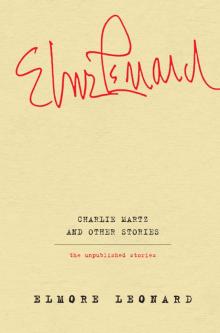 Charlie Martz and Other Stories: The Unpublished Stories
Charlie Martz and Other Stories: The Unpublished Stories Elmore Leonard's Western Roundup #2
Elmore Leonard's Western Roundup #2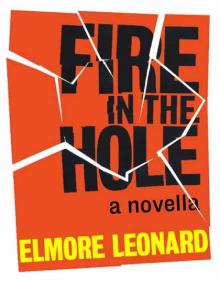 Fire in the Hole
Fire in the Hole Tishomingo Blues (2002)
Tishomingo Blues (2002)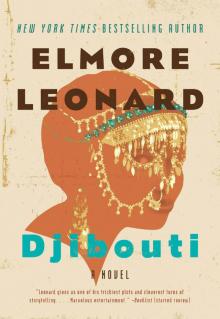 Djibouti
Djibouti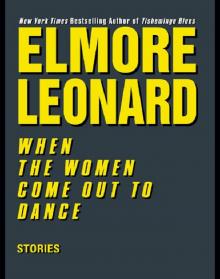 When the Women Come Out to Dance: Stories
When the Women Come Out to Dance: Stories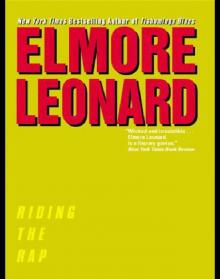 Riding the Rap
Riding the Rap Moment of Vengeance and Other Stories
Moment of Vengeance and Other Stories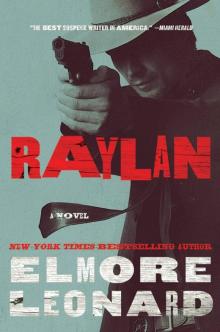 Raylan
Raylan Touch
Touch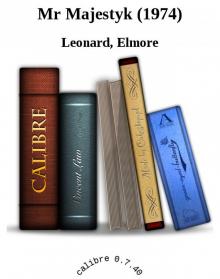 Mr Majestyk
Mr Majestyk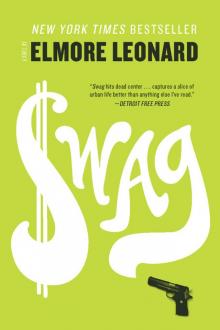 Swag
Swag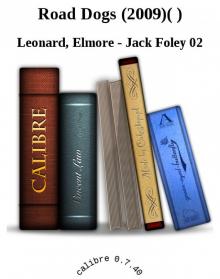 Road Dogs
Road Dogs La Brava
La Brava The Hot Kid
The Hot Kid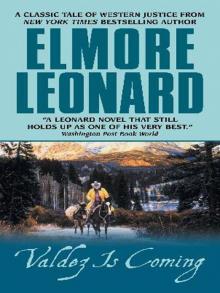 Valdez Is Coming: A Novel
Valdez Is Coming: A Novel Be Cool
Be Cool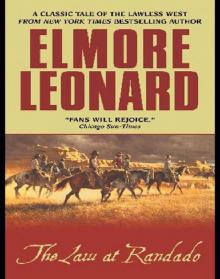 The Law at Randado
The Law at Randado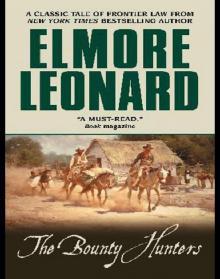 The Bounty Hunters
The Bounty Hunters When the Women Come Out to Dance
When the Women Come Out to Dance 310 to Yuma and Other Stories (1953)
310 to Yuma and Other Stories (1953)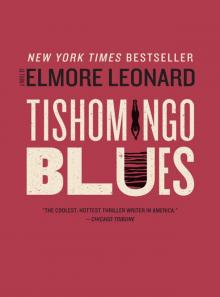 Tishomingo Blues
Tishomingo Blues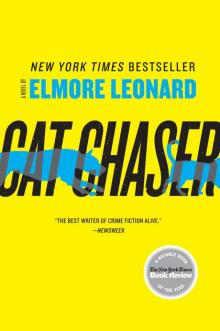 Cat Chaser
Cat Chaser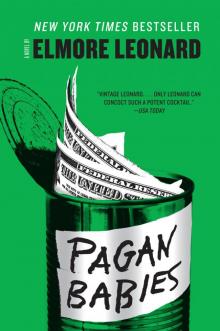 Pagan Babies
Pagan Babies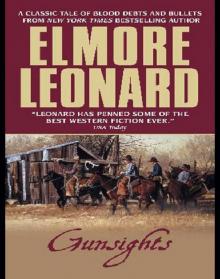 Elmore Leonard's Western Roundup #1
Elmore Leonard's Western Roundup #1 52 Pickup
52 Pickup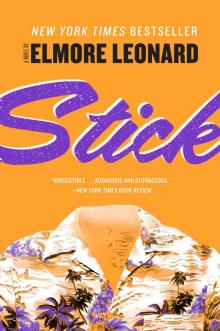 Stick
Stick The Moonshine War
The Moonshine War Valdez Is Coming
Valdez Is Coming City Primeval
City Primeval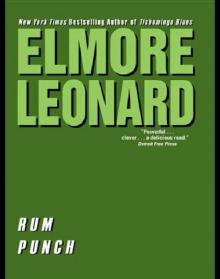 Rum Punch
Rum Punch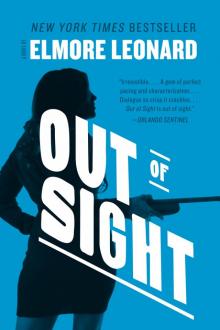 Out of Sight
Out of Sight Naked Came the Manatee (1996)
Naked Came the Manatee (1996)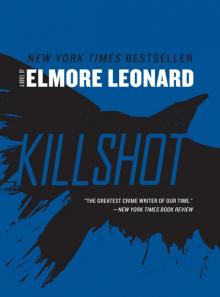 Killshot
Killshot Cuba Libre
Cuba Libre Forty Lashes Less One
Forty Lashes Less One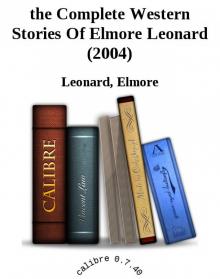 The Complete Western Stories of Elmore Leonard
The Complete Western Stories of Elmore Leonard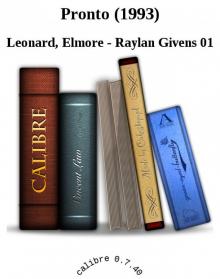 Pronto
Pronto Split Images
Split Images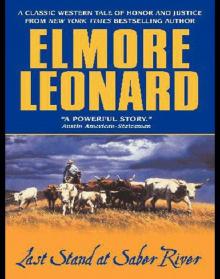 Last Stand at Saber River
Last Stand at Saber River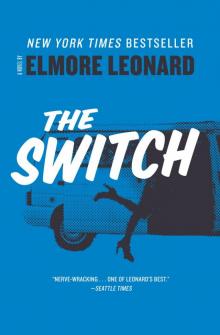 The Switch
The Switch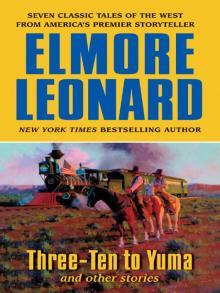 Three-Ten to Yuma and Other Stories
Three-Ten to Yuma and Other Stories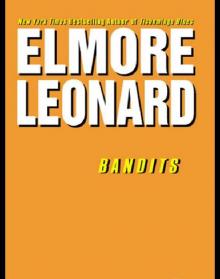 Bandits
Bandits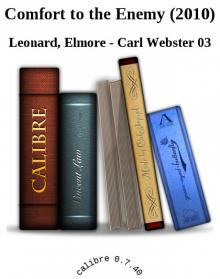 Comfort to the Enemy and Other Carl Webster Stories
Comfort to the Enemy and Other Carl Webster Stories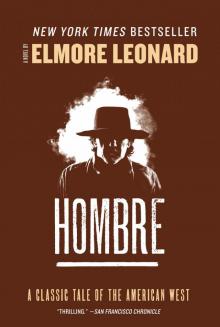 Hombre
Hombre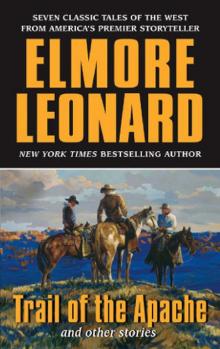 Trail of the Apache and Other Stories
Trail of the Apache and Other Stories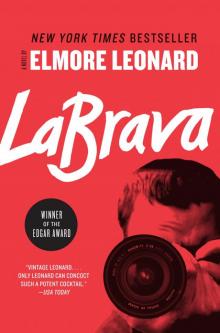 LaBrava
LaBrava Gold Coast
Gold Coast Jackie Brown
Jackie Brown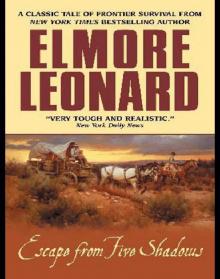 Escape From Five Shadows
Escape From Five Shadows Karen Makes out (1996)
Karen Makes out (1996)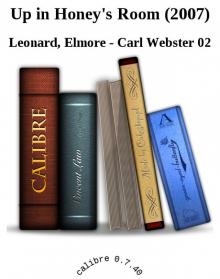 Up in Honey's Room
Up in Honey's Room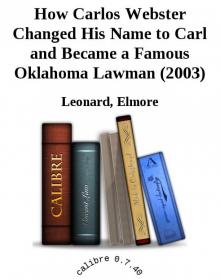 How Carlos Webster Changed His Name to Carl and Became a Famous Oklahoma Lawman (2003)
How Carlos Webster Changed His Name to Carl and Became a Famous Oklahoma Lawman (2003)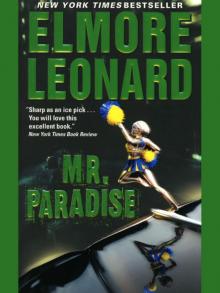 Mr. Paradise
Mr. Paradise The Hunted
The Hunted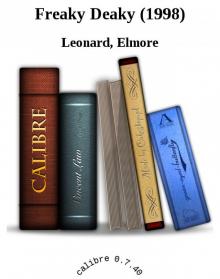 Freaky Deaky
Freaky Deaky Louly and Pretty Boy (Ss)
Louly and Pretty Boy (Ss)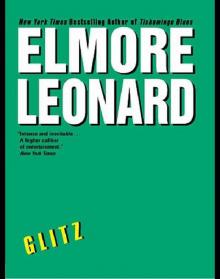 Glitz
Glitz A Coyote's in the House
A Coyote's in the House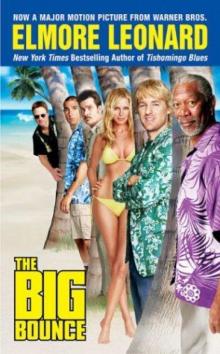 The Big Bounce jr-1
The Big Bounce jr-1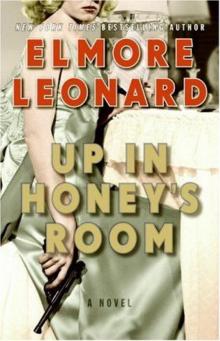 Up in Honey's Room cw-2
Up in Honey's Room cw-2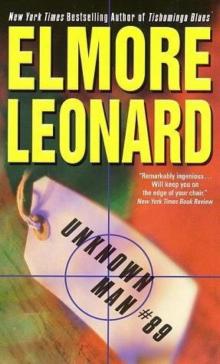 Unknown Man #89 jr-3
Unknown Man #89 jr-3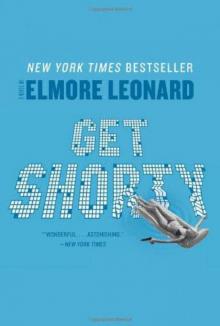 Get Shorty: A Novel cp-1
Get Shorty: A Novel cp-1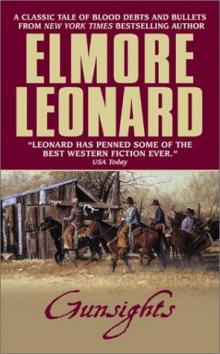 Gunsights
Gunsights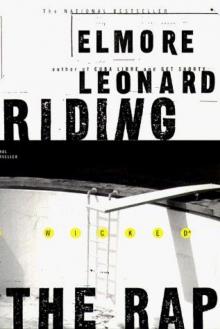 Riding the Rap rg-2
Riding the Rap rg-2